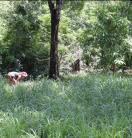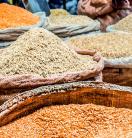Managing weeds to maintain rice productivity
A new ACIAR-supported project in Laos and Cambodia will help rice farmers manage weeds as they shift to the more sustainable and profitable practice of direct seeding.
‘Rice systems in Laos and Cambodia are evolving fast to respond to labour scarcity and low profitability,’ said Dr Eric Huttner, Research Program Manager for Crops at ACIAR.
‘The changes in crop management practices can benefit farmers but also create new issues.’
For example, gains made by shifting from the traditional approach of hand-planting rice seedlings in flooded fields to direct seeding crops are threatened by emerging weeds.
The new project aims to help farmers adopt integrated weed management practices to solve the problem.
Project leader Dr Jaquie Mitchell from the University of Queensland, said changes in the production system are driving the emerging weed problems in the rice fields, but those changes are necessary and beneficial.
‘Major migration from rural to urban areas means there are insufficient people to transplant where you need 30 people a day to plant one hectare, compared to broadcast which can be achieved by one to two people,’ Dr Mitchell said.
‘However, when farmers transplant, they typically use plants about 25 days old and as such are competitive to emerging weeds, and they are transplanted when water is available to control weeds.
‘When farmers broadcast or drill seed into soil the rice plant emerges at the same time as the weeds.’
Dr Mitchell said this had led to a change in the type and prevalence of weeds.
Cambodian project manager Dr Khay Sathya from the Cambodian Agricultural Research and Development Institute (CARDI) said the common problems in rice production in Cambodia are now caused by poor weed control.
‘Manual weed control isn’t applicable due to labour shortages and the time required for weeding,’ he said.
The project team will work with local communities to identify weed management strategies that will be evaluated over multiple seasons.
Lao project manager, Dr Phetmanyseng Xangsayasane from the National Institute of Agriculture and Forestry Research Institute (NAFRI) said the Lao PDR government aims to promote “green and clean” agriculture to help reduce climate impacts. He said to achieve this goal, research is needed into techniques for chemical free, direct-seeded rice production.
‘A number of alternative strategies such as pre-planting land preparation, mechanical weeders, weed competitive rice varieties, among others will be evaluated.’
By introducing integrated weed management packages, the project aims to support the shift to market economy to improve smallholders’ livelihoods.
Dr Huttner emphasised the importance of working with farmers to achieve this result.
‘Participatory research, based on experimental trials designed with farmers, will evaluate practical options for sustaining the next phase of rice growing in the region: this type of research is at the core of the ACIAR mandate,’ said Dr Huttner.
The project is scheduled to run in Laos and Cambodia until December 2025.




